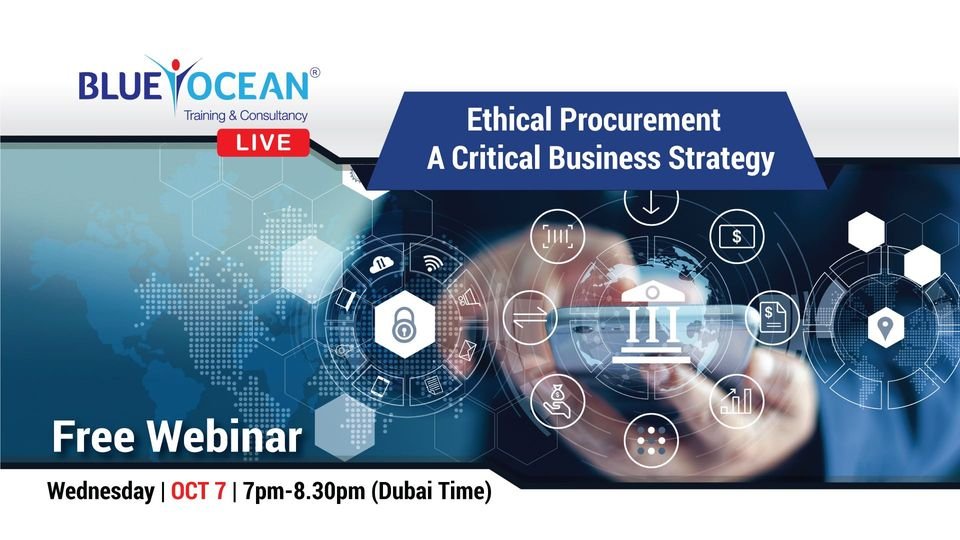Ethical Procurement – A Critical Business Strategy
 Blue Ocean Academy conducted a free webinar on the topic ‘Ethical Procurement – A Critical Business Strategy’. Around 150 professionals attended the insightful webinar.
Following are the important points discussed in the webinar:
Procurement is in a ‘stewardship’ role and the custodian of the company’s funds. In the absence of ethics in procurement, there would be a poor utilization of the company’s funds. In addition, procurement has a larger role to play towards the ‘society’ and those can only be achieved by following the ethical principles.
Ethics refers to the moral principles that govern a person’s behaviour. It determines what is right and wrong. There are several ethical issues in procurement which include bribery, corruption, violation of human rights, discrimination, abuse of power and conflicts of interests. Nowadays, customers refuse to buy products from organizations that don’t work on the basis of ethical principles. Poor sourcing may affect the reputation and brand of the organization.
There are several ethical frameworks that provide directions for organizations to function fairly. They are the Ethical Trading Initiative (ETI), the Conventions of the International Labour Organization (ILO), the Universal Declaration of Human Rights (UDHR) and Social Accountability Standards -SA 8000. The different laws that protect ethics in procurement are Antitrust Laws (US) / Competition Law (UAE and other countries), the Bribery Act 2010 (UK) (UAE Federal Laws), Anti-Corruption Laws (UAE Federal Laws, PCA 1988 – India) and the Modern Slavery Act 2015 (UK).
Blue Ocean Academy conducted a free webinar on the topic ‘Ethical Procurement – A Critical Business Strategy’. Around 150 professionals attended the insightful webinar.
Following are the important points discussed in the webinar:
Procurement is in a ‘stewardship’ role and the custodian of the company’s funds. In the absence of ethics in procurement, there would be a poor utilization of the company’s funds. In addition, procurement has a larger role to play towards the ‘society’ and those can only be achieved by following the ethical principles.
Ethics refers to the moral principles that govern a person’s behaviour. It determines what is right and wrong. There are several ethical issues in procurement which include bribery, corruption, violation of human rights, discrimination, abuse of power and conflicts of interests. Nowadays, customers refuse to buy products from organizations that don’t work on the basis of ethical principles. Poor sourcing may affect the reputation and brand of the organization.
There are several ethical frameworks that provide directions for organizations to function fairly. They are the Ethical Trading Initiative (ETI), the Conventions of the International Labour Organization (ILO), the Universal Declaration of Human Rights (UDHR) and Social Accountability Standards -SA 8000. The different laws that protect ethics in procurement are Antitrust Laws (US) / Competition Law (UAE and other countries), the Bribery Act 2010 (UK) (UAE Federal Laws), Anti-Corruption Laws (UAE Federal Laws, PCA 1988 – India) and the Modern Slavery Act 2015 (UK).
Common unethical practices in procurement
- Price-fixing and market-sharing
- Bid rigging
- Bribery to secure an order or disclosure of confidential information
- Over-charging of goods and services
- False invoices
- Duplicating payments
Role of the procurement professional
- Clearly understand differences between right and wrong behaviour
- Know the organization’s values, policies and processes
- Use all available tools to know their suppliers better before inviting them or awarding them
- Uphold ethical values, challenge unethical practices and promote sustainability wherever possible
Role of ethical procurement in business success
- Ethically compliant businesses produce better quality products and on time
- Choosing ethically compliant suppliers minimizes reputational risks and delivers other benefits to the business
- Being ethically compliant makes a business attractive to the customers and investors
- Customers are willing to pay more for ethically produced products
- Leads to greater compliance with legal and other obligations
Facebook
Twitter
LinkedIn
WhatsApp
Email
Sustainability & Supply Chain Building a Better Tomorrow
In the current scenario, sustainability in supply chains is crucial as businesses strive to reduce their environmental footprint while maintaining…


